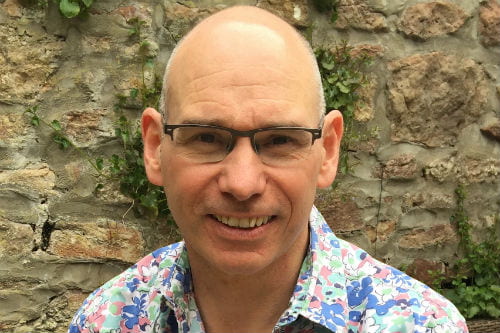 Prof Dek Woolfson, Director of the Bristol BioDesign Institute, has been elected to the Fellowship of the Royal Society, one of over 90 “outstanding researchers from across the world” to have received the honour this year. These include Prof Jonathan Clayden, who also works in the University of Bristol’s School of Chemistry.
Prof Dek Woolfson, Director of the Bristol BioDesign Institute, has been elected to the Fellowship of the Royal Society, one of over 90 “outstanding researchers from across the world” to have received the honour this year. These include Prof Jonathan Clayden, who also works in the University of Bristol’s School of Chemistry.
Professor Woolfson’s research is at the intersection between chemistry and biology. He applies chemical methods and principles to understand biological phenomena related to proteins. His group focuses on designing completely new protein structures and functions from scratch, and using these living cells to study natural biological functions.
Professor Woolfson said: “I was completely bowled over to learn that I had been elected a Fellow of the Royal Society. This is an honour for me personally, but, more importantly, it is recognition of my co-workers’ research over the past 30 years or so. Much of this work has been done at Bristol. I’m indebted to my fantastic colleagues in Chemistry, Biochemistry, and across the University for their collaboration, collegiality, and friendship over the last 20 years.”
Professor Clayden’s research focuses on designing and building molecules that have controlled but flexible three-dimensional architectures. His work has shown that dynamic molecules of this type can react in unusual and useful ways, or exhibit behaviours characteristic of much more complex biological counterparts.
The new reactions he has discovered allow a range of molecular structures of value in medicinal chemistry to be made with remarkable efficiency. Professor Clayden is also author of a globally acclaimed undergraduate textbook on Organic Chemistry.
Professor Clayden said: “I’m completely delighted, and extremely honoured, to have been elected as a Fellow of the Royal Society, recognising the ways that we have managed to harness the power of molecular synthesis to explore and illuminate broader scientific concepts.
“This honour is a recognition of the creativity and dedication of the outstanding co-workers I have been privileged to work with in my research group, and it underlines what outstanding, stimulating and collaborative places Bristol, and before that Manchester, have been (and still are!) to do imaginative and inventive science.”
As Fellows of the Royal Society, Professors Woolfson and Clayden join the ranks of Stephen Hawking, Isaac Newton, Charles Darwin, Albert Einstein, Lise Meitner, Subrahmanyan Chandrasekhar and Dorothy Hodgkin.
Sir Adrian Smith, President of the Royal Society, said: “It is with great pleasure that I welcome the latest cohort of outstanding researchers into the Fellowship of the Royal Society.
“Their achievements represent the very best of scientific endeavour, from basic discovery to research with real-world impact across health, technology and policy. From tackling global health challenges to reimagining what AI can do for humanity, their work is a testament to the power of curiosity-driven research and innovation.”
(The above news story – with the exception of the first paragraph – was first published by University of Bristol)




 The
The  Dr Kathleen Sedgley, the BBI’s Scientific Manager, has recorded a short video talking about her career for the
Dr Kathleen Sedgley, the BBI’s Scientific Manager, has recorded a short video talking about her career for the 
 Engineering Biology Mission Award Holders Professors
Engineering Biology Mission Award Holders Professors